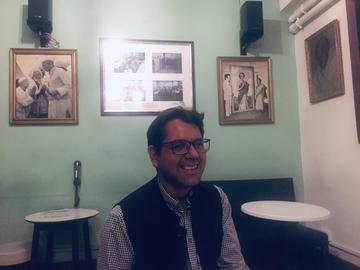Welcome to Professor Adnan Naseemullah
Professor Adnan Naseemullah will be joining the Contemporary South Asian Studies Programme (CSASP) in October 2025 as Professor of Comparative and South Asian Politics. Many thanks to Professor Naseemullah for making time to answer our questions ahead of his arrival.

What is your main area of research?
A lot of my research thus far has focused on the state in South Asia: how it arose, why it looks the way it does, how it has changed over time and how it interacts with different groups. That focus has taken me to lots of different areas of enquiry, from industrial development to colonial legacies and political violence. I’ve been increasingly drawn to the study of historical legacies – how the past might shape, though does not determine, the present. I’ve also zoomed out to explore how evolving global institutions have shaped national economic trajectories, leading to patterns of exclusion and disruption in domestic politics.
How did your interest in this begin?
I did my undergraduate degree in political science and economics at Swarthmore, a small liberal arts college just outside Philadelphia, Pennsylvania. I graduated just after 9/11 and the invasion of Afghanistan and the toppling of the Taliban regime. These events would have profound impacts on political order in Pakistan, which was the root of my eventual interest in uneven state formation and political violence. My doctoral work in political science was at the University of California, Berkeley. At the time, many in the department were preoccupied with the comparative, historical understanding of how states and markets shape one another as institutions. This inspired my fieldwork in India and Pakistan on how manufacturing firms have managed institutional relationships with capital and labour following the retrenchment of the state’s post-colonial role in managing these markets for development, leading to my first book. Following postdoctoral fellowships at LSE and Johns Hopkins, I’ve worked at King’s College London in the War Studies Department and the India Institute, before my appointment at OSGA.
What has been the main focus of your research recently?
In the last few years, I have been focusing on the politics of populism, and what the right-wing populist mobilisations in India and Pakistan over the last decade can teach us about the state and about democracy, in South Asia and beyond. Pradeep Chhibber (UC Berkeley) and I wrote Righteous Demagogues last year as a way of explaining why populism keeps recurring in India and Pakistan. While wrestling with that question, we settled on an analytical approach informed by political economy and party systems, which we believe has broad applicability for other regions, like Europe and Latin America. We’re currently working on a project that uses what we learned about populism in comparative perspective to investigate what democracy means in an age of anti-establishment backlash.
What will you be teaching at OSGA?
I will be primarily teaching on the MSc in Modern South Asian Studies and the MPhil in Global and Area Studies. I am particularly excited about offering an option paper for both on ‘the Political Economy of Inequality in South Asia,’ which suggests inequality as a lens through which to explore the political development of South Asian countries and the consequences of inequality on political violence and electoral competition.
What are you looking forward to about your time in Oxford?
I am thrilled to join the intellectual community at OSGA, and at the University of Oxford more broadly. My own experience of studying politics is that it is naturally cross-disciplinary, multimethod and best informed by profound commitments to knowing regions and their histories, before making more systematic comparisons and attempting generalisations. OSGA is thus an ideal home for my work! I’m very much looking forward to collaborating and teaching with both new colleagues and old friends across the School and the University, and to be welcomed into Wolfson College, which has a cosmopolitan sensibility, gorgeous modern architecture and a calming, verdant location by the Cherwell.





